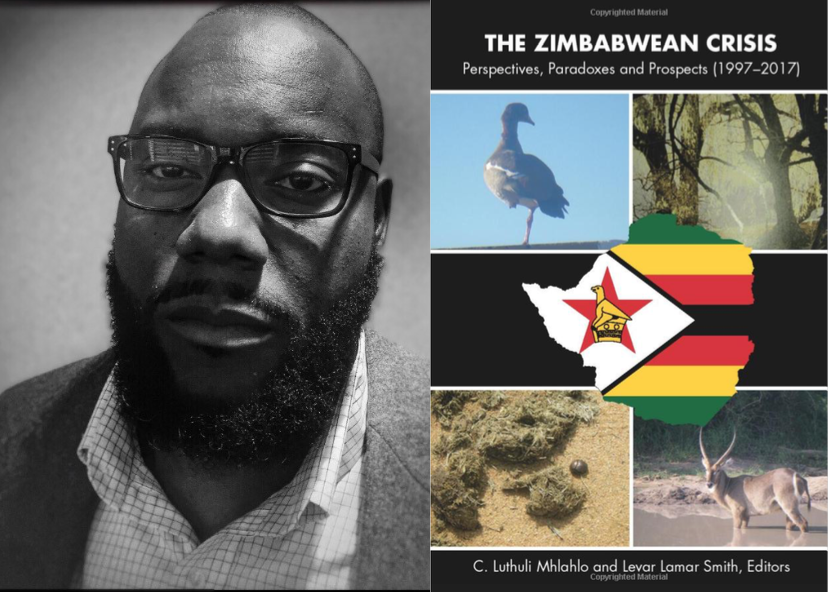Back To Blog
The Zimbabwean Crisis: Perspectives, Paradoxes and Prospects, 1997–2017
July 16, 2020Written by: Morehouse College
This post is part of the Faculty Research Committee's author interview series. Today the FRC shares a conversation with Dr. Levar Smith about his new co-edited book, The Zimbabwean Crisis: Perspectives, Paradoxes and Prospects, 1997–2017 (Peter Lang, 2019).
______
What key lessons do we learn from The Zimbabwean Crisis?
Within Africanist discourses (notably within political science) there remains a tendency to focus primarily on the choices that individual leaders make which create various moments of “crisis” in political and economic development. Given that the idea of “crisis” is often explained through western theoretical lenses in the language of “underdevelopment” or “state failure,” the complexities of African states like Zimbabwe are often framed around depictions of “good or bad governance” under romantic narratives of capricious elites determined to hold onto power by any means. Yet, the Zimbabwean Crisis is unique in that it offers a multifaceted and interdisciplinary way of understanding the political and economic challenges of Zimbabwe through the lens of young scholars who from a variety of perspectives including foreign policy, political economy, colonial and post-colonial history, and sociology give readers an intimate glimpse into a society in flux. This volume is essential in drawing attention to how African states like Zimbabwe confront deep political and economic changes and prolonged periods of “crisis” while addressing how ordinary citizens develop strategies which allowed them to endure two decades of rule.
Mugabe's reign came to an abrupt end as you were working on this book. How did that turn of events affect the book?
The sudden ouster of Robert Gabriel Mugabe from power in November 2017 provided a shot in the arm to scholars writing on Zimbabwe in ways which energized our commitment to developing new ways of interpreting the nation and continent at large. The release of Michael Bratton’s “Power Politics in Zimbabwe” in 2015 had crystallized Zimbabwe as a space which no longer required intense scrutiny given the durability of his “big man rule.” Scholars had grown accustomed to understanding the Zimbabwean state through the rhetorical and populist speeches which punctuated Mugabe’s latter years. Although there was an expectation that Mugabe himself would not remain in power at the ripe age of 93, there was real possibility that Mugabe’s wife Grace would assume control in Zimbabwe with the support of the military “securocrats” who had generously benefitted from his rule. The soft coup and emergence of Emmerson Mnangagwa at the helm of the country and the Zimbabwe African National Union Patriotic Front (ZANU-PF) offered new questions regarding the future of Zimbabwe and a wealth of information about how power was projected and maintained within the state. Given that this book originally started as a conversation between Zimbabwean scholars retrospectively analyzing the economic and political decline in Zimbabwe from 1997-2007, the book was expanded to provide new insights into how the state under Mugabe affected women, housing, small business creation, and the broader political imagination. The end of the Mugabe era made the book come alive in ways unimaginable to many of us.
You teach African politics at Morehouse. How has that course shaped your research on Zimbabwe?
I have been very fortunate at Morehouse to teach African Politics to a very captive audience of brilliant young black men who have raised my own critical awareness of the continent—to intimately understand how the dynamics within and external to African states are changing in real time. We draw from a variety of sources including news, popular culture, and academic literature in utilizing African politics as a method to deconstruct existing stereotypical discourses of African states and societies that obscure the importance of Africa’s own voice and agency. As a comparative researcher on Zimbabwe, I am constantly reminded of my goal to “speak to” Zimbabweans through examining the richness of their political experiences in Zimbabwe rather than to “speak for” their developmental shortcomings. In this vein, it is important that my research on Zimbabwe always allows me to situate myself as an observer of the dynamics of political transitions and political economy in Zimbabwe. In my African politics course we begin the course with writings on Africa by Morehouse men, which allows each student to see how their own pursuit of knowledge in answering complex human questions can eventually be equally empowering.
What is next for you?
I am currently working on two main book projects. The first book is derived from my doctoral research in which “Constructing the State: Elite Settlements in Authoritarian Zimbabwe” seeks to draw attention to how political pacts between ruling governments and opposition parties often influence political outcomes and authoritarian resilience. While it is often understood that political pacts may lead to democracy in some states, the goal of this research on Zimbabwe is to focus on how political agreements between elites prolong the hold on power within existing regimes. The second book project is more ambitious as it aims to demonstrate how international and domestic pressures for democratization in the 1990’s undermined the process of state-building in Africa and led to the current democratic impasse found within many African states. The aim of the second project is to emphasize the need for security and capacity within borders that allow citizens to benefit from the presence of the state in ways that legitimize democracy in Africa.
______
Levar Smith, Ph.D. is an assistant professor of political science and international studies.

Tag(s):
Morehouse Faculty